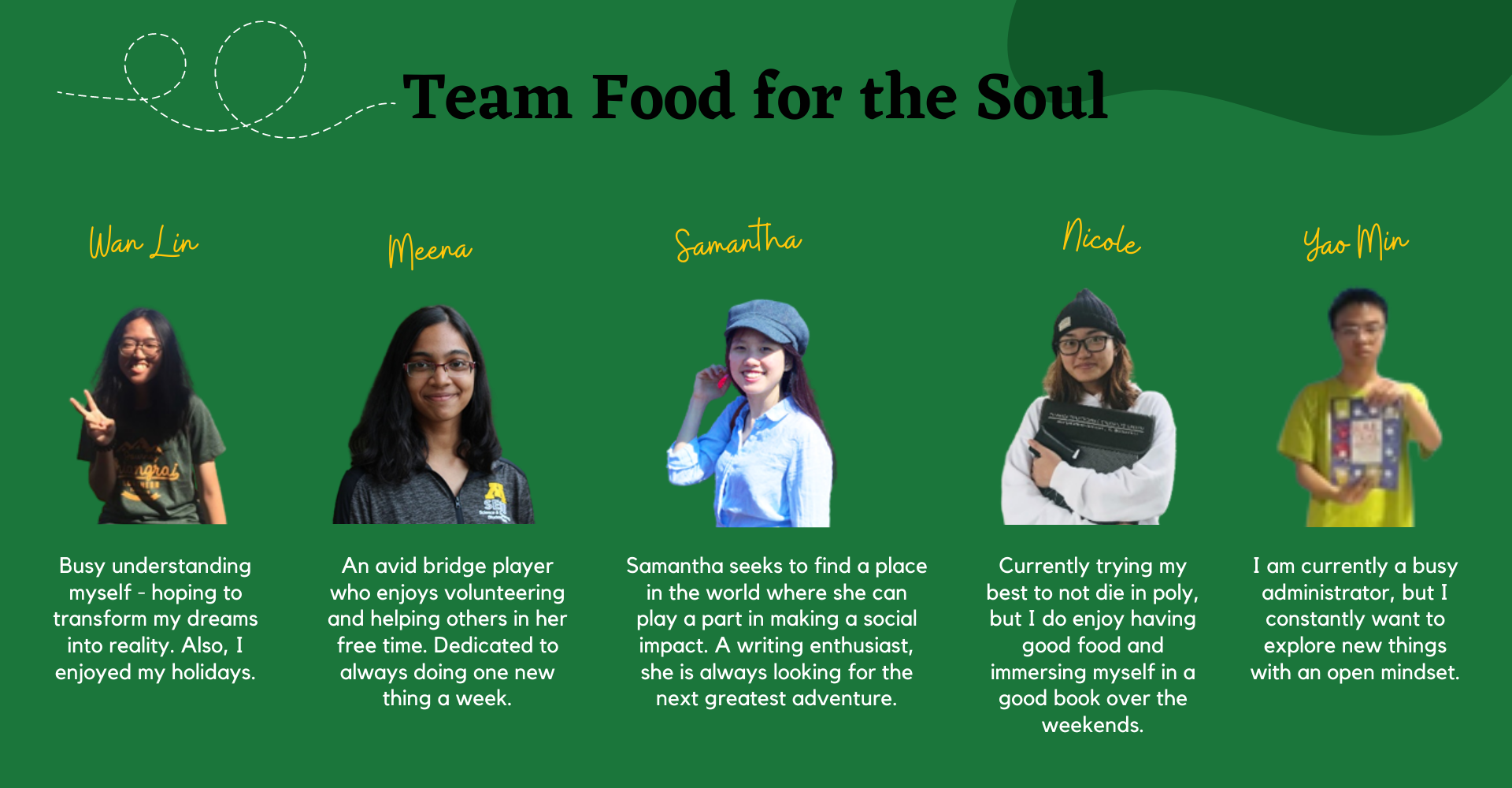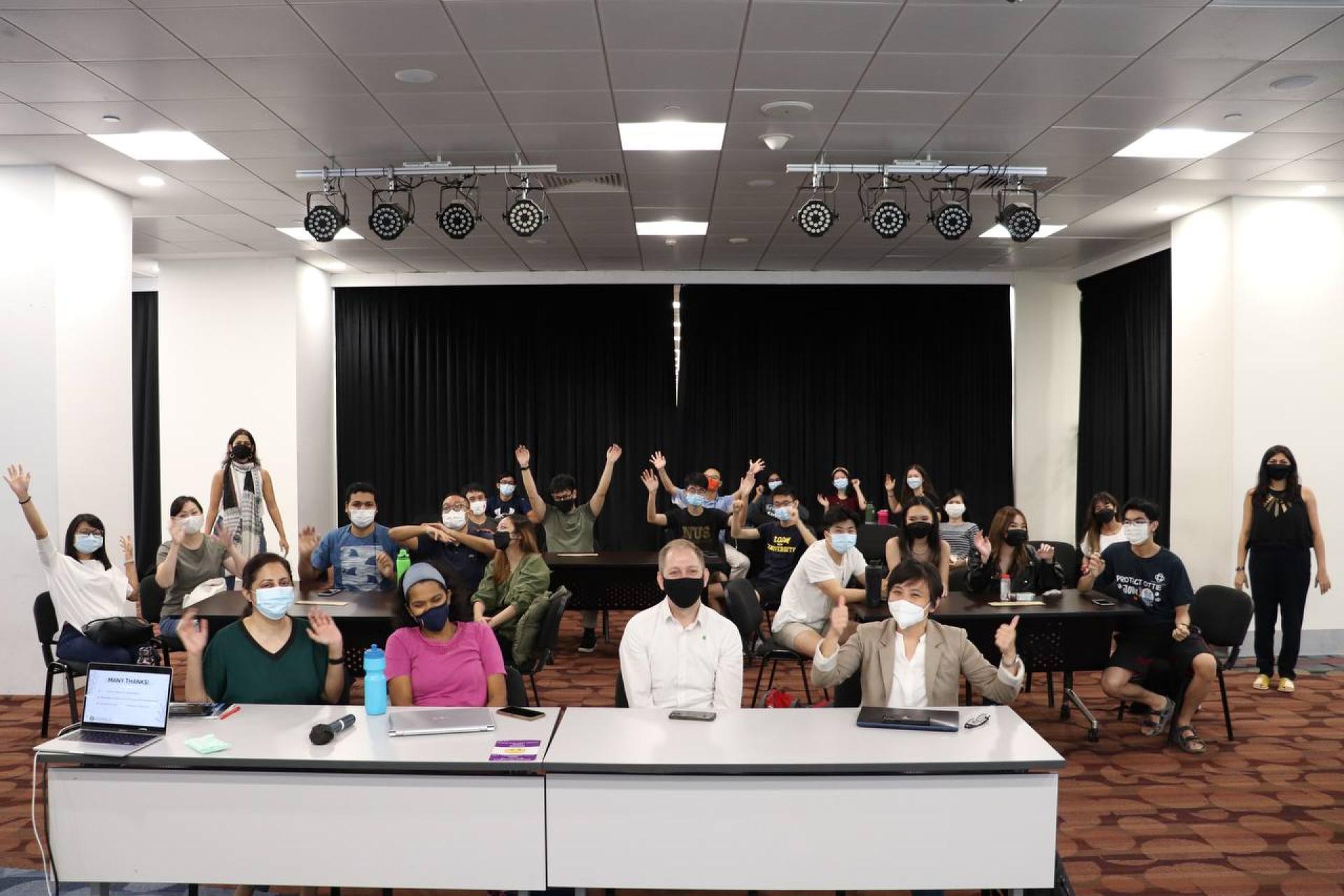This is a feature of the winning team of the 6th Zero Waste Bootcamp held in 2021.
The Zero Waste Bootcamp (ZWB) is a 12-16 week programme by Secondsguru, an environmental social enterprise. This “bootcamp” brings youth together and equips them with the skills, knowledge, and mentorship needed to hone their environmental stewardship and manage their own sustainability projects. The 6th Zero Waste Bootcamp (ZWB 6) took place in 2021, where 25 youth took on the challenge to craft and execute eco+social projects in the community. They collaborated with local non-profit organisations like HortPark, Food Bank, Food from the Heart and PAssion WaVe to tackle sustainability issues in Singapore.
Meet the members of the winning team of ZWB 6, team Food for the Soul:

Team Food for the Soul worked to support The Food Bank Singapore, with a goal to create persuasive pitches aimed at sponsorships for healthier food bundles for their beneficiaries. They hope to promote these options to corporations and raise public awareness about healthy eating.
Why did you choose this project?
Samantha: When I was studying abroad, I came across community meals that made simple 3 course meals out of unsold food. This community affair is for the local community, and welcomes people who do not come by warm and nutritional meals easily. I've had the opportunity to befriend some of the diners and formed a connection with them. From this experience, I got interested in food insecurity. I wanted to understand more about this issue, especially in Singapore. At the same time, I was also looking for sustainability projects. I had a growing interest in ESG but was unsure where to begin. So I looked for sustainability projects to join and came across the bootcamp. And the rest is history.
Meena: During the circuit break of Covid-19, I had come to realise the importance of eating well and what a sedentary lifestyle could do to our bodies. I watched many documentaries on how the food we eat impacts us, especially in the future, and began being interested in tracking the diets of people around me to see if we all had a sufficient nutritional intake. Somewhere along the way, I happened to chance upon a documentary from CNA called 'Hunger in Singapore' and it's where I came to know of the food insecurity issue in Singapore and wanted to help with this problem.
Our team worked to support The Food Bank Singapore, with a goal to create persuasive pitches aimed at sponsorships for healthier food bundles for their beneficiaries. This is inline with Food Bank Singapore’s mission to end food insecurity in all forms in Singapore (food insecurity is the lack of access to nutritious foods). Currently, there is a $15 standard bundle and a $25 healthier bundle (includes fresh foods), however the take up rate by corporate donors for the $25 healthier bundle is rather low. To address this gap, our team has sourced for a cheaper vegetable supplier to provide the fresh vegetables required and we have created a $20 healthier bundle as a midway option, while transforming the existing $25 healthier bundle to become a premium bundle. A corporate pitch proposal and video to promote this $20 healthier option were also created in the hopes that corporations would go for the $20 bundle rather than the $15 standard bundle. To raise public awareness about healthy eating, we have also created a nutrition quiz that allows the public to learn some facts about healthy eating in an interactive manner.
Food for the Soul team leader Meena during a brainstorming session
What were some challenges you faced from this experience?
We faced a lot of time constraints among group members and coordination with the Food Bank. We also had to continuously realign our efforts and views to what the Food Bank and their beneficiaries actually needed. There were also practical difficulties, such as having to find cheaper suppliers with just one source to ensure consistent delivery timings on the food packing day, etc.
It was definitely a good opportunity to learn about zero waste in Singapore and what is currently being done to tackle this issue. We learned that communication is a key factor to success, and effective scheduling is essential to keep ourselves on the right track. We also saw that making a difference isn’t simply about lending a hand—it’s about listening out for what the other person needs, it’s about paying attention to what is fundamental to the cause.
Were there any particularly memorable encounters?
We were not expecting how difficult it actually is to plan a food bundle that will be well utilised by the beneficiaries. There are many criteria to take into account, such as whether the food provided will be well-received by beneficiaries, e.g. some beneficiaries don’t eat brown rice. We also had to consider the fact that some households may not have the tools or equipment (e.g. refrigerator, stove, pots, etc.) required to prepare the food given to them, which not only contributes to food waste, but more importantly affects their daily needs. For example, the elderly are typically unable to cook at home, so the bundle we catered toward the elderly would only have fresh fruits that can be consumed easily and are soft, and would not contain fresh vegetables that need to be cooked.
 The teams and panel at the final event of Zero Waste Bootcamp 6.
The teams and panel at the final event of Zero Waste Bootcamp 6.
We realised the importance of initiatives like the Food Bank’s Masak Masak programme, that teaches beneficiaries recipes to cook with the food bundles they provide, and educates them on healthy eating. Their latest research launch of The Hunger Report II in collaboration with LCSI also illustrates the positive impact of catering to specific needs in this way and affording them more autonomy and dignity.
It’s important that people understand that even though the beneficiaries are getting donations from the public, we cannot expect them to accept all food items provided, especially if they do not have the means to utilise it. It's important for us to see them as people with their own preferences and needs and we should try not to impose what we think is best for them.
All images courtesy of Secondsguru and team Food for the Soul.




Comments